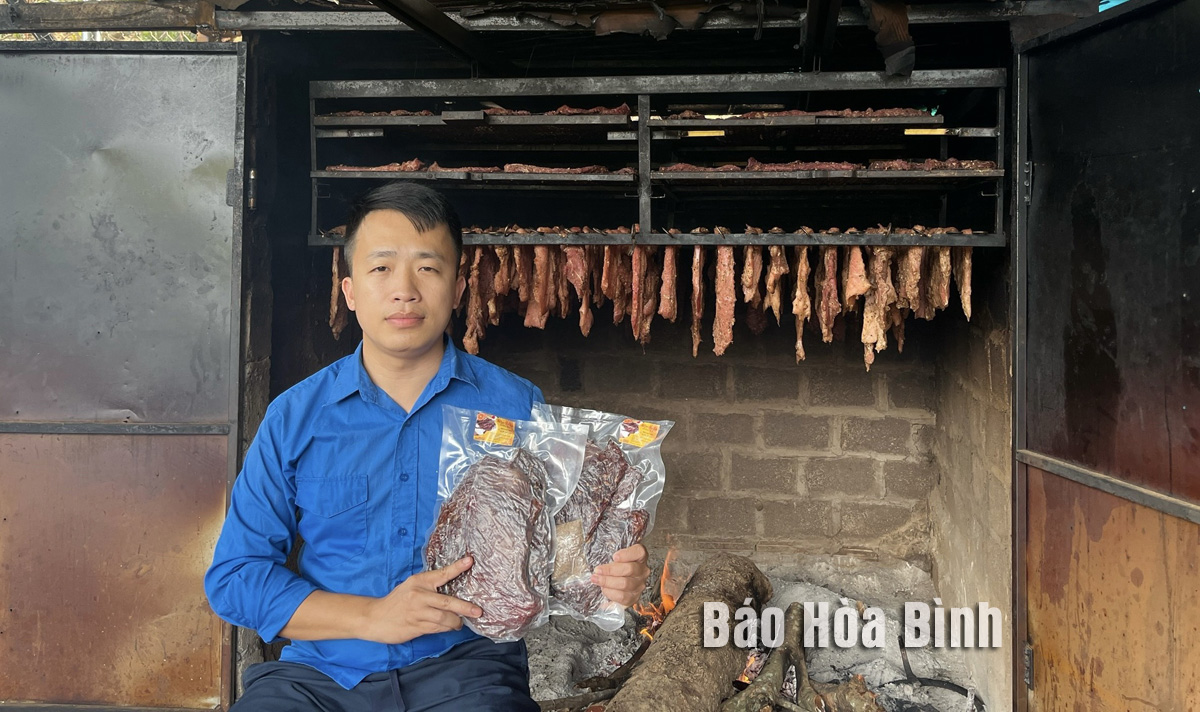
Appreciating the abundant potential and strengths of his hometown for tourism development, Ha Cong Hung, Deputy Secretary of the youth union of Mai Chau district’s Mai Hich commune, embarked on producing smoked meat with a desire to introduce his homeland's specialty to domestic and international tourists.
Ha Cong Hung, from Mai Hich commune, Mai Chau district, introduces his smoked meat product.
Hung began producing his first products in 2017 using locally available buffalo, pork, and beef, which helped ensure the delicious, northwest-standard taste and food safety thanks to traditional breeding methods.
He said his mother is the inspiration and motivation for him to build this model. The dish is very special, only made on special occasions, such as holidays and the traditional New Year festival (Tet).
According to him, to make delicious smoked meat, it is necessary to choose fresh meat from reputable suppliers that meet food safety standards. The meat used for smoking should be from the shoulder, buttocks, and thighs to prevent excessive fat loss during the process. The native pig meat, raised by locals, is often lean, firm, and sweet, giving the smoked dish a distinctive flavour. The processing involves removing tendons, fat and marinating the meat with various traditional spices of the Thai ethnic group. It is essential to use wood from longan trees for smoking to preserve the unique flavour, with an appropriate temperature kept throughout the drying process. As a result, each piece of smoked buffalo or pork meat has a dry and firm outer shell, but the inside is pink and tender. Moreover, no preservatives or chemicals are used during processing to ensure product quality and consumer health.
Currently, Hung's production facility has obtained food safety certification and is in the process of completing documents to have its product accredited under the One Commune One Product (OCOP) programme.
Annually, the facility produces 2.2-2.5 tonnes of smoked meat, generating revenue of about 1.5 billion VND (59,370 USD) and profit of 400 million VND.
Hung said the initial success achieved is thanks to the attention and support of the local Party committee, authorities, and youth union in guiding young people in starting business. With the union’s assistance in reaching customers at homestays and via social media platforms in the area, the product has been widely promoted.
Ha Cong Dat, Secretary of Mai Chau district’s youth union, said Hung not only is a role model for youth union members and young people to follow but also helps boost the local youth entrepreneurship movement.
Dao Village’s honey – a product certified with a 3-star OCOP (One Commune One Product) rating by Thong Nhat Agricultural Cooperative in Dao Village (Hoa Binh City) – is highly regarded by consumers for its quality, richness, and variety in packaging. The distinctively sweet taste of Dao Village’s honey leaves a lasting impression on anyone who has tried it.
In alignment with Project No. 07-DA/TU, issued by the Hoa Binh provincial Party Committee on November 1, 2021, Lac Thuy district has actively promoted investment and supported the sustainable development of its industrial and handicraft sectors during the 2021–2025 period. Alongside this, the district has remained committed to preserving and revitalising traditional craft villages.
Located in the northern part of Lac Thuy district, with a temperate climate and fertile soil, Phu Thanh commune has great potential and advantages in growing tea. The long-standing experience, combined with strict adherence to organic farming practices in the tea gardens, ensures that the dried tea products from Phu Thanh and Lac Thuy as a whole are sold out immediately upon production, providing a stable and prosperous life for the local people.
Amid efforts to streamline the administrative apparatus, Hoa Binh province has intensified measures to address challenges in land clearance, resettlement support, and infrastructure investment, aiming to speed up the progress of key projects.
Hoa Binh province has posted an unprecedented economic growth rate of 12.76% in the first quarter of 2025, marking its highest quarterly performance to date and positioning it as the second fastest-growing locality in the country, trailing only Bac Giang province.
Under current regulations, products in the One Commune – One Product (OCOP) programme that are rated three stars or higher must undergo re-evaluation every three months. However, in reality, some of these products fail to consistently meet the required standards, raising concerns about the sustainability of their OCOP certification. This underscores the urgent need for producers to enhance product quality and gradually develop their OCOP products into strong, marketable brands.



